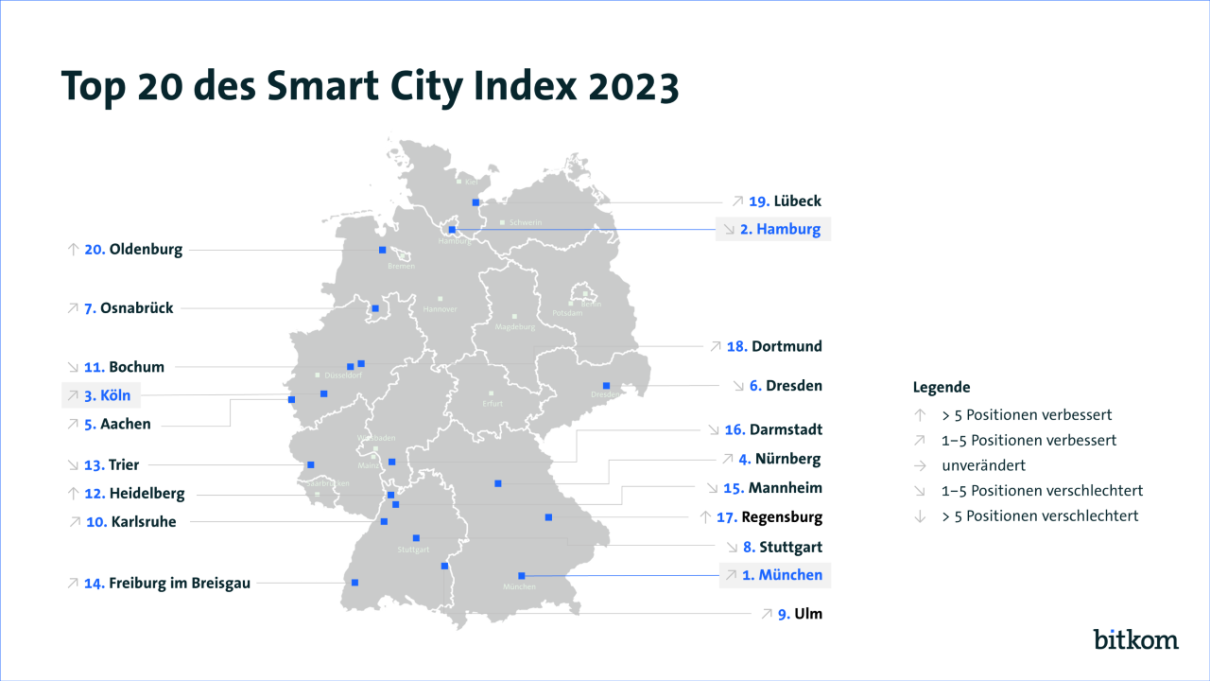Page content
Munich leads Smart City Index 2023

The Smart City Index determined the current state of digitization in 81 major German cities. Graphic: bitkom
With 84.5 out of a possible 100 points, Munich has taken the top spot in the overall ranking - closely followed by Hamburg with 83.9 points and Cologne with 83.2 points. These are the results of the Smart City Index 2023, which Bitkom has now presented.
The index assesses the digitalization of major German cities in five main categories: Administration, IT and communication, energy and environment, mobility, and society and education. For this purpose, a total of more than 12,700 data points for 81 cities were collected, reviewed and qualified.
The top 10 at a glance:
1st Munich (84.5 points)
2nd Hamburg (83.9 points)
3rd Cologne (83.2 points)
4th Nuremberg (80.1 points)
5th Aachen (79.3 points)
6th Dresden (78.5 points)
7th Osnabrück (77.6 points)
8th Stuttgart (77.2 points)
9th Ulm (76.8 points)
10th Karlsruhe (76.6 points)
Bitkom President Dr. Ralf Wintergerst emphasized the importance of digitalization for cities: "The fifth Smart City Index shows the state of digitalization in major German cities more precisely than ever before. We have expanded the indicators examined, and we have also included the important topic of education for the first time. We see a great deal of momentum within the ranking. However, the top 10 includes not only metropolises such as Munich and Hamburg, but also smaller university cities such as Aachen, Osnabrück and Ulm. This shows once again that you don't have to be big to be smart. What's more important is professional management of digitalization activities and a joint commitment from local politicians, companies and civil society."
Hidden champions and focus topics
The index also shows that cities have different strengths in different categories: Trier, ranked 13th overall, secures pole position in the energy and environment category. Ulm has also made a remarkable climb, making it into the top 10 for the first time at 9th place (76.8 points). Düsseldorf, Regensburg, Bochum and Augsburg shone in the administration category. Kiel came third in IT and communications.
Digitalization is not progressing at the same pace everywhere
Overall, there are considerable differences between the German states in terms of the digitalization of their cities. Cities in Baden-Württemberg, Bavaria and Saxony perform better on average, while North Rhine-Westphalia and Lower Saxony tend to do worse. It is noticeable that university cities achieve better results on average, according to Wintergerst: "In cities with universities, the exchange between science and practice is much easier. Cities also benefit from tech startups with their innovative use of technology and fresh look at challenges. When startups get the opportunity to test smart city applications on site in collaborations, it's a classic win-win situation."
Cities such as Rostock, Erfurt and Göttingen have been particularly successful - Rostock has climbed 31 places to rank 40, Erfurt, still ranked last in 2022, lands in 55th place this year, and Göttingen makes up 20 places and is ranked 53rd in the 2023 Smart City Index. "Digitalization is not a state of affairs in cities either, but a process of constant change", Wintergerst emphasizes.
Smart Country Convention brings together politics, digital economy and administration
The Smart City Index shows that digitalization is not just a question of technological capacity, but also of implementation and collaboration. This is also one of the central themes of SCCON, which will be held at the Berlin Exhibition Grounds from November 7 to 9, 2023.
On the first day of the trade fair, the Smart City Index award will be presented to the winning cities at 1:45 p.m. on the Plaza Stage.
Tickets for SCCON are available free of charge in the online ticket store.
Become an exhibitor at #SCCON25
As a driving force for the future of digital administration and for equal digital living and working conditions in cities and rural areas, the Smart Country Convention is a must for all stakeholders who actively advance the digital transformation. Are you interested in advancing the digitization of our cities and municipalities too? Join us and position your company or municipality as an expert in digitalization in the public sector.



